 W
WAgainst Method: Outline of an Anarchistic Theory of Knowledge is a 1975 book about the philosophy of science by Paul Feyerabend, in which the author argues that science is an anarchic enterprise, not a nomic (customary) one. In the context of this work, the term anarchy refers to epistemological anarchy.
 W
WAsimov's Biographical Encyclopedia of Science and Technology is a history of science by Isaac Asimov, written as the biographies of over 1500 scientists. Organized chronologically, beginning with Imhotep and concluding with Stephen Hawking, each biographical entry is numbered, allowing for easy cross-referencing of one scientist with another. Nearly every biographical sketch contains links to other biographies. For example, the article about John Franklin Enders [1195] has the sentence "Alexander Fleming's [1077] penicillin was available thanks to the work of Howard Florey [1213] and Ernst Boris Chain [1306]. . ." This allows one to quickly refer to the articles about Fleming, Florey, and Chain. It includes scientists in all fields including biologists, chemists, astronomers, physicists, mathematicians, geologist, and explorers. The alphabetical list of biographical entries starts with ABBE, Cleveland [738] and ends with ZWORYKIN, Vladimir Kosma [1134]
 W
WThe Beginnings of Western Science, subtitled The European Scientific Tradition in Philosophical, Religious, and Institutional Context, 600 B.C. to A.D. 1450 or The European Scientific Tradition in Philosophical, Religious, and Institutional Context, Prehistory to A.D. 1450, is an introductory book on the history of science by David C. Lindberg. The book focuses on what is called Western science, prominently covering Greek, Roman, Islamic and Mediaeval European science, while the 2007 second edition expands on precursors to Greek science, such as Mesopotamian and Egyptian science, and on Islamic science. "Western science" is defined as scientific enquiry done in Greek, Latin or Arabic according to reviewer William A. Wallace.
 W
WComputer: A History of the Information Machine is a history of computing written by Martin Campbell-Kelly and William Aspray first published in 1996. It follows the history of "information machines" from Charles Babbage's difference engine through Herman Hollerith's tabulating machines to the invention of the modern electronic digital computer. A revised 2nd edition published in 2004 included new material on the Internet and World Wide Web, while the updated 3rd edition published in 2013 includes contributions from historians Nathan Ensmenger and Jeffrey Yost. The 3rd edition extends the story to include recent phenomena such as social networking and revises the discussion of early history to reflect new insights from the literature.
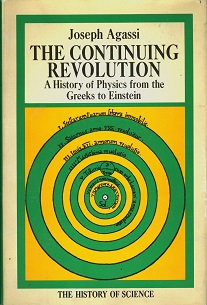 W
WThe Continuing Revolution: A History of Physics from the Greeks to Einstein is a 1968 book by the philosopher Joseph Agassi. Published by McGraw-Hill Book Company, it written as a three-week discussion with Agassi's son Aaron.
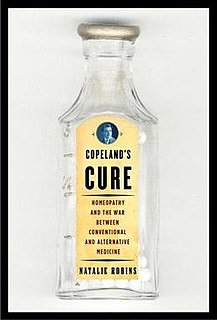 W
WCopeland's Cure is a book-length history of the rivalry between mainstream medicine and homeopathy written by Natalie Robins and published by Knopf in 2005.
 W
WEchoes of Life: What Fossil Molecules Reveal about Earth History is a book written by Susan M. Gaines, Geoffrey Eglinton, and Jurgen Rullkotter concerning organic chemistry and, in particular, the links between the living and the material Earth. It was published by Oxford University Press in 2008.
 W
WThe Evolution of Physics: The Growth of Ideas from Early Concepts to Relativity and Quanta is a science book for the lay reader. Written by the physicists Albert Einstein and Leopold Infeld, it traces the development of ideas in physics. It was originally published in 1938 by Cambridge University Press. It was a popular success, and was featured in a Time cover story.
 W
WFields of Force: The Development of a world view from Faraday to Einstein is a book by William Berkson, published in 1974 by Routledge in the U.K. and John Wiley & Sons in the U.S.. It is an extension of his doctoral thesis, which was supervised by Karl Popper and examined by A.I. Sabra. Berkson credits the book with an influence from Joseph Agassi. It was republished in 2014 by Routledge, as part of their Library Editions: 20th Century Science. A Spanish Translation, Las teorías de los campos de fuerza was published in 1981 by Alianza Editorial.
 W
WForces and Fields :The concept of Action at a Distance in the history of physics (1961) is a book by Mary B. Hesse, published by Philosophical library.
 W
WThe Fourth Paradigm: Data-intensive Scientific Discovery is a 2009 anthology of essays on the topic of data science. Editors Tony Hey, Kristin Michele Tolle, and Stewart Tansley claim in the book's description that it presents the first broad look at the way that increasing use of data is bringing a paradigm shift to the nature of science.
 W
WFrom Darwin to Hitler: evolutionary ethics, eugenics, and racism in Germany is a 2004 book by Richard Weikart, a historian at California State University, Stanislaus, and a senior fellow for the Center for Science and Culture of the creationist Discovery Institute. The work is controversial. Graeme Gooday, John M. Lynch, Kenneth G. Wilson, and Constance K. Barsky wrote that "numerous reviews have accused Weikart of selectively viewing his rich primary material, ignoring political, social, psychological, and economic factors" that helped shape Nazi eugenics and racism.
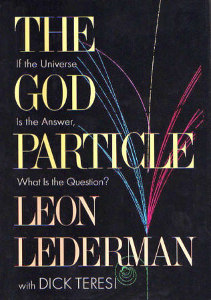 W
WThe God Particle: If the Universe Is the Answer, What Is the Question? is a 1993 popular science book by Nobel Prize-winning physicist Leon M. Lederman and science writer Dick Teresi.
 W
WA Hole In Texas is a novel by Herman Wouk. Published in 2004, the book describes the adventures of a high-energy physicist following the surprise announcement that a Chinese physicist had discovered the long-sought Higgs boson.
 W
WKuhn vs. Popper: The Struggle for the Soul of Science is a 2003 book by the sociologist Steve Fuller, in which the author discusses and criticizes the philosophers of science Thomas Kuhn and Karl Popper. The book, published by Columbia University Press, received several negative reviews.
 W
WThe Launching of Modern American Science, 1846–1876 is a 1987 nonfiction book by American historian Robert V. Bruce, published by Knopf. The book is a social history chronicling a three-decade period in American science. It won the 1988 Pulitzer Prize for History.
 W
WLeviathan and the Air-Pump: Hobbes, Boyle, and the Experimental Life is a book by Steven Shapin and Simon Schaffer. It examines the debate between Robert Boyle and Thomas Hobbes over Boyle's air-pump experiments in the 1660s. In 2005, Shapin and Schaffer were awarded the Erasmus Prize for this work.
 W
WThe Penultimate Curiosity: How science swims in the slipstream of ultimate questions is a book jointly written by English author and artist Roger Wagner and English scientist Andrew Briggs, which sets out to answer one of the most important, vexed, and profound questions about the development of human thought: ‘What lies at the root of the long entanglement between science and religion?’
 W
WPeriodic Tales: A Cultural History of the Elements, from Arsenic to Zinc is a 2011 popular science and history book by English writer Hugh Aldersey-Williams, on the history and cultural associations of the chemical elements. The book is divided into five sections, "Power", "Fire", "Craft", "Beauty", and "Earth", which group elements according to their primary cultural connotations, rather than their position on the periodic table. For certain elements such as phosphorus, the author documents his attempts to obtain samples by reproducing the original method of discovery. He also visits the site of discovery of several elements uncovered in modern times, including the famed Ytterby mine in Sweden, from which seven new elements were isolated.
 W
WThe Poisoner's Handbook: Murder and the Birth of Forensic Medicine in Jazz Age New York is a New York Times best-selling non-fiction book by Pulitzer Prize-winning science writer Deborah Blum that was released by Penguin Press in 2010.
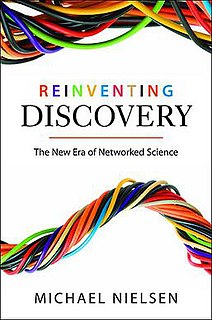 W
WReinventing Discovery: The New Era of Networked Science is a book written by Michael Nielsen and released in October 2011. It argues for the benefits of applying the philosophy of open science to research.
 W
WRocket Men: The Daring Odyssey of Apollo 8 and the Astronauts Who Made Man's First Journey to the Moon is a 2018 nonfiction book by Robert Kurson recounting NASA's 1968 Apollo 8 mission, which was the first crewed spacecraft to reach the Moon and return safely to Earth. The book is Kurson's fourth, and it debuted on the New York Times bestseller list.
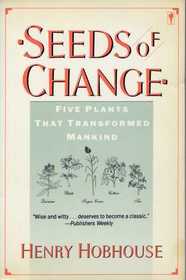 W
WSeeds of Change: Five Plants That Transformed Mankind is a 1985 book by Henry Hobhouse which explains how the history of the world since Columbus linked America to Europe and has been changed by five plants. It describes how mankind's discovery, usage and trade of sugar, tea, cotton, the potato, and quinine have influenced history to make the modern world.
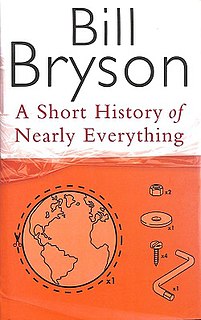 W
WA Short History of Nearly Everything by American-British author Bill Bryson is a popular science book that explains some areas of science, using easily accessible language that appeals more to the general public than many other books dedicated to the subject. It was one of the bestselling popular science books of 2005 in the United Kingdom, selling over 300,000 copies.
 W
WThe Sleepwalkers: A History of Man's Changing Vision of the Universe is a 1959 book by Arthur Koestler. It traces the history of Western cosmology from ancient Mesopotamia to Isaac Newton. He suggests that discoveries in science arise through a process akin to sleepwalking. Not that they arise by chance, but rather that scientists are neither fully aware of what guides their research, nor are they fully aware of the implications of what they discover.
 W
WThe Story of Modern Science is a ten-volume book series by Henry Smith Williams, published by Funk and Wagnalls Co. The books, published in 1923, explained in detail the current technology and scientific methods of the Modern Era.
 W
WThe Structure of Scientific Revolutions is a book about the history of science by the philosopher Thomas S. Kuhn. Its publication was a landmark event in the history, philosophy, and sociology of scientific knowledge. Kuhn challenged the then prevailing view of progress in science in which scientific progress was viewed as "development-by-accumulation" of accepted facts and theories. Kuhn argued for an episodic model in which periods of conceptual continuity where there is cumulative progress, which Kuhn referred to as periods of "normal science", were interrupted by periods of revolutionary science. The discovery of "anomalies" during revolutions in science leads to new paradigms. New paradigms then ask new questions of old data, move beyond the mere "puzzle-solving" of the previous paradigm, change the rules of the game and the "map" directing new research.
 W
WTetrabiblos (Τετράβιβλος) 'four books', also known in Greek as Apotelesmatiká (Ἀποτελεσματικά) "Effects", and in Latin as Quadripartitum "Four Parts", is a text on the philosophy and practice of astrology, written in the 2nd century AD by the Alexandrian scholar Claudius Ptolemy.
 W
WThe Turning Point: Science, Society, and the Rising Culture is a 1982 book by Fritjof Capra, in which the author examines perceived scientific and economic crises through the perspective of systems theory.